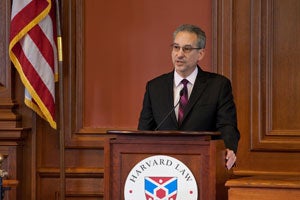Debating what Harvard Law School Dean Martha Minow called “one of the most important public policy issues and one of the most important constitutional issues,” three law professors offered different perspectives on whether the individual mandate portion of the Affordable Care Act (ACA) violates the commerce clause of the Constitution and infringes on personal liberties.
 Co-sponsored by the HLS Federalist Society and the Petrie-Flom Center for Health Law Policy, Biotechnology, and Bioethics, the debate and discussion on March 24 featured HLS professors Charles Fried and Laurence Tribe ’66 [photo right], both of whom argued for the constitutionality of the mandate, and Randy Barnett ’77, a former student of both, who is now teaching at Georgetown University Law Center, and whom Minow called the “mastermind” of the legal challenge against the ACA. That challenge, which is expected eventually to reach the Supreme Court, thus far has had mixed results, with two courts deeming the mandate unconstitutional while two others have upheld the provision.
Co-sponsored by the HLS Federalist Society and the Petrie-Flom Center for Health Law Policy, Biotechnology, and Bioethics, the debate and discussion on March 24 featured HLS professors Charles Fried and Laurence Tribe ’66 [photo right], both of whom argued for the constitutionality of the mandate, and Randy Barnett ’77, a former student of both, who is now teaching at Georgetown University Law Center, and whom Minow called the “mastermind” of the legal challenge against the ACA. That challenge, which is expected eventually to reach the Supreme Court, thus far has had mixed results, with two courts deeming the mandate unconstitutional while two others have upheld the provision.
Just as those courts offered different interpretations of whether imposing the mandate was an allowable use of Congress’s powers, so did the professors, who each teach constitutional law. Barnett outlined what he called the “truly extraordinary and objectionable nature of the individual mandate,” noting that it is an unprecedented requirement in U.S. history. Though Congress can compel people to be drafted into the military or sit on a jury, those activities relate to, as the Supreme Court put it, the “supreme and noble duty” of citizenship, he added.
“There is no supreme and noble duty of citizens to enter into contracts with private companies,” said Barnett, who added that the mandate would result in a “fundamental alteration in the status of American citizens.”
He also contended that the individual mandate goes beyond the powers of Congress granted under the Commerce Clause in that it regulates economic inactivity, comparing it to regulating people’s decisions not to sell their belongings. Though proponents of the mandate cite the economic consequences of not buying health insurance, failing to act still is not economic activity, he said.
“The Affordable Care Act did not regulate the activity of obtaining health care,” said Barnett. “Instead, the bill requires everyone to buy health insurance whether they seek health care or not.”
 Fried [photo left] questioned the importance of the distinction between economic activity and inactivity, citing Chief Justice John Marshall’s view that Congress has the power to regulate commerce, a power granted under Article 1, Section 8 of the Constitution.
Fried [photo left] questioned the importance of the distinction between economic activity and inactivity, citing Chief Justice John Marshall’s view that Congress has the power to regulate commerce, a power granted under Article 1, Section 8 of the Constitution.
“Insurance is commerce. Health insurance is commerce,” said Fried, who served as solicitor general in the Reagan Administration and later as a Massachusetts Supreme Court justice. “Why then is not the mandate within that power?”
Tribe expanded upon that point, noting that failing to buy health insurance shifts the cost to others.
“There’s no right to force a society to pay for your medical care by taking a free ride on the system,” he said.
Thus, conduct is being regulated, he contended. Such conduct is subject to the Commerce Clause as much as a decision to act, said Tribe, citing precedent from as far back as 1790, when Congress penalized ship owners for failing to provide medicine on their ships.
 But Barnett said that Congress can only regulate those who choose to engage in economic activity — for example, it can require a motel owner to accommodate members of racial minorities. He said if Congress wanted to increase access to health care, then it could have used its tax powers. But since it did not want to pay the political cost of doing so, it instead imposed an unprecedented burden on individuals, he said.
But Barnett said that Congress can only regulate those who choose to engage in economic activity — for example, it can require a motel owner to accommodate members of racial minorities. He said if Congress wanted to increase access to health care, then it could have used its tax powers. But since it did not want to pay the political cost of doing so, it instead imposed an unprecedented burden on individuals, he said.
Fried said that the mandate was a product of Congress’s reluctance to institute socialized medicine or a government option.
“It is ironic that an effort to keep health insurance in the private sector is seen as an enormous assault on our liberties,” he said. Tribe also noted that if a state such as Massachusetts has the power to impose a health insurance mandate, then it is hard to argue that the federal government doing the same thing would violate personal liberty.
Not surprisingly, the panelists also had different predictions on a possible Supreme Court decision on the mandate. According to Tribe, the Court has consistently upheld Congress’s right to regulate interstate commerce, including people’s decisions that have broad economic consequences, such as not buying health insurance. But Barnett said the Court would not have to strike down any other law in order to overturn the mandate and would “draw the line at regulating inactivity.”
